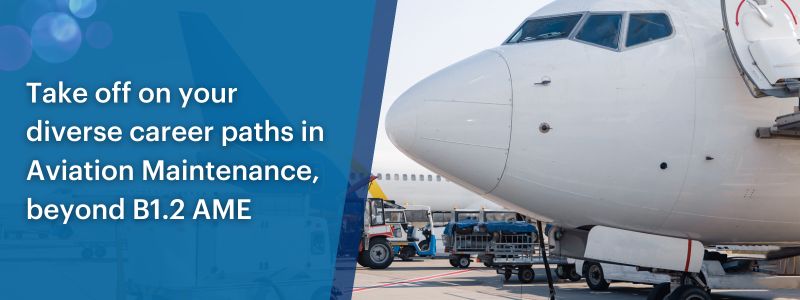
Pursuing a B1.2 aircraft maintenance engineering course is a splendid achievement. This course can be a start to your brighter future in the world of aviation maintenance. But the journey doesn’t stop here. The aviation sector is quite vast and so are the job roles in the aviation sector.
This license or degree opens the door to a variety of thrilling career paths that extend beyond the hangar floor. Let’s dive into the various career and job opportunities after pursuing a B1.2 AME course.

The skillset in the aviation sector requires a degree or certificate but the candidate should also have the skills to do the tasks assigned as an AME-certified student. The freshers should be highly qualified with skills and also know the processes and tricks. The engineer should ensure high safety standards of compliance by carefully inspecting the aircraft during the inspection repair and maintenance process.
The engineer should leverage the knowledge to create clear and concise technical manuals and documentation for aircraft maintenance procedures. The new candidates should contribute to the development and testing of the newly crafted models of aircraft and also ensure their airworthiness and performance.
There are various job positions and career opportunities for AME engineers in the aviation sector. There are roles such as engine specialist, avionics specialist, airframe and structures specialist, and more. The engineer should target getting these roles by equipping the required skills and qualifications for these specific roles. For being an engine specialist the aircraft maintenance engineers should dive into the world of engines and focus on learning how the troubleshooting processes are done and how the MRO’s perform these tasks and accordingly learn the skills from their respective institutes.

There are various aeronautics institutes offering specialization courses for the aviation sector. The institutes give hands-on experience and also they give practical training to their students so that they know what attracts them the most and then they can choose their specialization accordingly. If anyone wants to be an avionics specialist then the person should have the skillset on how to communicate and also understand the aircraft electronics system. The engineers should get in-depth knowledge of how aircraft structures, and how they work and also focus on landing gear workings, wings working, and other airframe components.

Apart from being an AME engineer, enthusiasts must learn different skills and also have requirements such as experience or internships attended. The more the person is qualified, the higher the chances for the candidate to move further in the future. Engineers should continue their education and also specialize in any one field of the aviation sector as learning is an important part of any career.
The engineers should explore various other certifications related to their field and also attend training so that they can enhance their skills and be experts in their specific area. Engineers should improve their communication skills and also have management and critical thinking skills so that they can excel in their chosen path.
The traditional career paths for an AME engineer were in MROs and Airlines but the new engineer should start thinking about their career in private jet operators and government aviation sectors as the competition might be less there.
The importance of networking in any field is as important as gaining a degree. Networking helps create and open more doors for future career opportunities. The institutes teaching the AME courses allow students to network with various professional organizations to build their network and also they organize various meetups and events and call the experts of the aviation sector. The engineer should discuss the strategies with their managers and build a proper work-life balance so that they can enjoy their work and enhance their careers. The prospects should start attending various workshops and also the conferences where the aviation sector professionals could be seen and they should start approaching them to stay current in the field. In all only a degree cannot boost an aeronautics career but skills and additional certifications with a degree can change their career, take them to a higher position, and boost their career.
